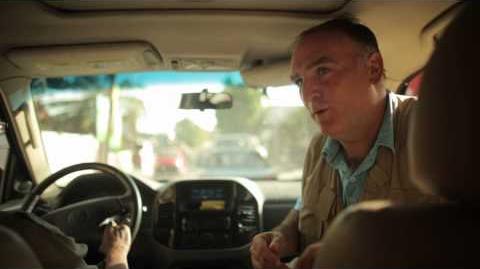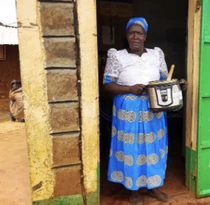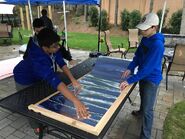Tom Sponheim (talk | contribs) mNo edit summary |
|||
| (7 intermediate revisions by one other user not shown) | |||
| Line 1: | Line 1: | ||
{{GoogleTranslateLinks}} |
{{GoogleTranslateLinks}} |
||
| − | {{Updated| |
+ | {{Updated|12|18|19}} |
<table cellspacing="2"><tr> |
<table cellspacing="2"><tr> |
||
<td valign="top" width="45%">__TOC__</td> |
<td valign="top" width="45%">__TOC__</td> |
||
| Line 43: | Line 43: | ||
*{{NewJul16}}'''April 2015:''' El Fuego del Sol wins the 2015 Energy Globe Award for Haiti. [http://www.energyglobe.info/haiti2015?cl=en&id=162926/ Read more...] |
*{{NewJul16}}'''April 2015:''' El Fuego del Sol wins the 2015 Energy Globe Award for Haiti. [http://www.energyglobe.info/haiti2015?cl=en&id=162926/ Read more...] |
||
| − | *'''November 2014:''' On their Facebook page, [[Haiti Solar Oven Partners]] reported that they built 50 solar cookers during a workshop that was attended by 85 students. |
||
| − | |||
| − | [[File:Sun_and_Ice_training_in_Haiti,_10-23-14.png|300px|thumb|[[Sun and Ice]] teaching integrated cooking in Haiti. - ''Sun and Ice'']] |
||
| − | *'''October 2014:''' [[Sun and Ice]] recently sent more than 100 [[Premium14]] and [[SK14]] [[parabolic solar cooker]]s to [[Haiti]]. They also sent [[fuel-efficient cookstove]]s and [[heat-retention cooking]] baskets along with the solar cookers to teach the [[Integrated Cooking Method]]. Use the solar cooker when it is sunny, use the fuel-efficient stove when it is not, and use the heat-retention basket with both cooking approaches. |
||
| − | |||
| − | *'''August 2014:''' A group of volunteers known as the [[Haiti Solar Oven Partners]] from First United Methodist Church of Jamestown, {{state|North Dakota}} recently traveled to Moffit, N.D., to help fabricate solar ovens to be used in [[Haiti]]. Teams of volunteers travel to Haiti each year to live in communities that have invited them. For ten days, these volunteers work with Haitians to build ovens and educate people about solar cooking. Their goal is to deliver 2,300 solar ovens plus hands-on training to Haitian families every year. [http://www.jamestownsun.com/content/first-united-methodist-church-volunteers-help-solar-ovens Read more...] |
||
| − | |||
| − | [[File:World_Central_Kitchen_new_parabolic_solar_cooker,_12-28-13.jpg|thumb|300px|Chefs display their new [[parabolic solar cooker]] at the [[World Central Kitchen]] in [[Haiti]]]] |
||
| − | *'''December 2013:''' Chefs at the [[World Central Kitchen]] in [[Haiti]] show off their new [[parabolic solar cooker]] for use at their commercial kitchen. |
||
| − | |||
| − | *'''September 2013:''' [[Haiti Solar Oven Partners]] will be traveling {{state|North Dakota}}, [[USA]] with its Haitian leaders, Montas Joseph and Raymonde Joseph, to spread the word about solar-powered ovens utilized in the poverty-stricken nation of [[Haiti]], and to bolster potential volunteers for the cause. Montas Joseph, Haitian director of HSOP, and Raymonde Joseph, HSOP training director, will visit 29 United Methodist churches in North Dakota and South Dakota throughout September. [http://bismarcktribune.com/news/local/haitians-to-say-thanks-for-solar-ovens/article_103c1506-117f-11e3-a6b7-0019bb2963f4.html Read more about the project.] |
||
| − | |||
| − | *'''February 2013:''' Changes are coming to Tilori, [[Haiti]] as well. Twenty-five families are learning to cook Haitian meals like soup, beans, potatoes, yucca, plantains and rice with energy-efficient stoves and solar ovens — little or no wood or charcoal is needed. [[Solar Household Energy]] (SHE), a U.S.-based nonprofit organization that introduces solar and alternative cooking to communities, recently distributed the stoves that were purchased with [[Nature Conservancy]] funding. [[Louise Meyer]], trainer from SHE, will continue to provide on-going technical assistance and encourage the women to support each other as they learn this new way of cooking. Read more at [http://www.nature.org/newsfeatures/specialfeatures/nature-feeds-our-families.xml Solar Cookers: Making Life Easier for Women] |
||
| − | |||
| − | [[File:Haiti_Scheffler_project_2012,_1-31-13.jpg|thumb|300px|The Scheffler Community Kitchen installed in Hinche, [[Haiti]] in 2010 with help from [[Alec Gagneux]]]] |
||
| − | [[File:Haiti_Scheffler_training_2010,_1-31-13.jpg|thumb|300px|Students at the 2010 workshop assemble the [[Scheffler Community Kitchen]].]] |
||
| − | *'''January 2013: Scheffler Community Kitchen installed in Hinche, Haiti''' - [[Alec Gagneux]] of [[GloboSol]] helped facitate the construction of a [[Scheffler Reflector Solar Cooker]] at a workshop held in Hinche, [[Haiti]] from August 10th through October 15th, 2010. The first reflector was installed in front of the cafeteria of the education center. The students themselves installed the second reflector in an orphanage in the village of Dospalais. They were supervised minimally in order to make the workshop as self-reliant as possible. They also received information about possible [[Business development|income generation]] approaches to be able to raise their standard of living. |
||
{{OldNewsLink}} |
{{OldNewsLink}} |
||
| Line 149: | Line 132: | ||
The activity was at least partially supported by a loan from the Overseas Private |
The activity was at least partially supported by a loan from the Overseas Private |
||
Investment Corporation (OPIC) and from the U.S. Agency for International |
Investment Corporation (OPIC) and from the U.S. Agency for International |
||
| − | Development. Sun Oven owner, [[Paul |
+ | Development. Sun Oven owner, [[Paul Munsen]], was honored at the United States House of Representatives with the award of the U.S. Department of Commerce's Export Achievement Award for their innovative work in Haiti. Given the desperate situation of the forest situation in Haiti, combined with favorable insolation in most of the country, the country will remain a prime candidate for solar cooking promotion. |
{{ArchivedPagesForHistory}} |
{{ArchivedPagesForHistory}} |
||
| + | |||
=={{HeadingClimateCulture}}== |
=={{HeadingClimateCulture}}== |
||
[[File:Haiti_solar_radiation_map.jpg|right|432px]] |
[[File:Haiti_solar_radiation_map.jpg|right|432px]] |
||
| Line 173: | Line 157: | ||
*'''March 2010:''' [http://www.haitiinnovation.org/en/2010/03/23/rapid-assessment-cooking-fuel-needs-post-quake-haiti A Rapid Assessment of Cooking Fuel Needs in Post Quake Haiti] |
*'''March 2010:''' [http://www.haitiinnovation.org/en/2010/03/23/rapid-assessment-cooking-fuel-needs-post-quake-haiti A Rapid Assessment of Cooking Fuel Needs in Post Quake Haiti] |
||
*'''January 2010:''' [http://www.theoildrum.com/node/6168 Haiti's Energy Problems] - ''The Oil Drum'' |
*'''January 2010:''' [http://www.theoildrum.com/node/6168 Haiti's Energy Problems] - ''The Oil Drum'' |
||
| + | *{{NewAug19}}{{EnergySituationEnergypedia}} |
||
*{{WikipediaClimate|https://en.wikipedia.org/wiki/Haiti#Climate}} |
*{{WikipediaClimate|https://en.wikipedia.org/wiki/Haiti#Climate}} |
||
*[[Solar cooker dissemination and cultural variables]] |
*[[Solar cooker dissemination and cultural variables]] |
||
| Line 201: | Line 186: | ||
===Audio and video=== |
===Audio and video=== |
||
| + | *{{NewJun19}}'''November 2018:''' |
||
| + | ::[[File:Solar Cookers International working in Haiti|none|400px]] |
||
| + | *{{NewDec19}}'''June 2017:''' |
||
| + | ::[[File:Interview with Solavore solar oven user in Haiti|thumb|none|400px|PPAF Senior Fellow Tom Setchel interviewed Marie Mica, a Cotes-de-Fer, Haiti resident, on her experience in using a Solavore solar oven.]] |
||
*{{NewOct17}}'''October 2017:''' |
*{{NewOct17}}'''October 2017:''' |
||
::[[File:How a Haitian village cooks with sunlight|none|400 px]] |
::[[File:How a Haitian village cooks with sunlight|none|400 px]] |
||
Revision as of 23:22, 15 February 2020
|
Last edited: 18 December 2019
|
|
The World Central Kitchen, founded by internationally known chef José Andrés in 2010, has proposed, and been implementing, a sustainable solution to food shortages in Haiti. Their mission is to promote local food production and purchasing, educating the public about solar cooking and the integrated cooking method, and using these new skills to create opportunities for local income generation. Learn more about the World Central Kitchen. |
Events
Featured international events
- 4-6 June 2024 (Bridgetown, Barbados): Sustainable Energy for All Global Forum - The event will be co-hosted by Sustainable Energy for All (SEforALL) and the government of Barbados. It is a platform for government, business and finance leaders, entrepreneurs, and youth and community representatives from around the world to come together to broker new partnerships, spur new investment, and address challenges at the nexus of energy, climate, and development. More information...
Online events
- NEW: Thursday, 18 April 2024 (2:30pm-3:15pm EDT), (Washington, D.C., USA): ESMAP Spring Meetings Knowledge Café: Clean Cooking at the Heart of Energy Access - Join ESMAP for this exciting knowledge-sharing opportunity, which will showcase the role of clean cooking as a key part of energy access and energy transition. Presentations by René van Hell, Director of Inclusive Growth, Ministry of Foreign Affair, Netherlands, Dr. Kandeh Yumkella Chairman, Presidential Initiative on Climate, Renewable Energy and Food Security, Sierra Leone, and Chandrasekar Govindarajalu, Practice Manager, ESMAP, World Bank. In-person attendance at World Bank Atrium, MC Front Lobby is for Spring Meetings registrants only. However, you can watch the event online
Requests for proposal
- Decentralized Renewable Energy Solutions utilizing Solar and Bio-Energy - Sustainable Energy Technologies and Assessments of ScienceDirect, is requesting guest-author submissions. The special issue, VSI: DRES is devoted to publishing research articles reporting the innovative designs and design interventions in solar thermal and bio-energy for decentralized energy systems (DES). It includes i) new and novel designs of prototype or commercial devices and technologies, their development, modeling and simulations and experimental validation; ii) innovations for processes, techniques, utilization, and applications; iii) novel use of materials for improving efficiency, performance, techno-economic feasibility, and sustainability and iv) research findings addressing the socio-economic, health and safety impacts, and life cycle assessments leading to proposing novel devices for DES. The Deadline for submission is 31 July 2024. More submittal information...
- See also: Global Calendar of Events and past events in Haiti
News
- January 2019: Solar Energy Drying in Haiti: Reducing Peanut Loss - In 2019, Sun Buckets in partnership with Acceso Peanut Company committed to research the causes and extent of postharvest peanut loss in Haiti and design, build, and field test a prototype crop dryer utilizing solar thermal storage, a product that can also be used for household cooking. Throughout Haiti, the domestic peanut market is characterized by low production volumes and high seasonal price volatility. As such, Haitian peanut farmers often store their peanut harvest for several months until they are able to receive more favorable prices in the market. Often, the crop is exposed to humid conditions without proper ventilation leading to contamination. Through this commitment, Sun Buckets will test the hypothesis that drying practices are the foundational cause of most peanut losses and create a prototype storage container that collects, stores, and recovers solar thermal energy to not only heat air and product, but also move air as needed for a dryer.
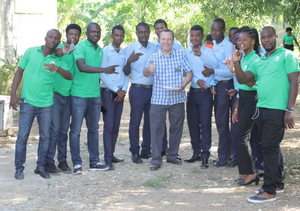
SCI Science Director, Dr. Alan Bigelow, meets with University Notre Dame Hinche students to discuss solar cooking technology Photo credit: SCI
- July 2018: SCI Science Director visits Haiti - Dr. Alan Bigelow worked in Haiti with SCI Associate Rose Bazile to share solar cooking technology and the Performance Evaluation Process. They discussed water pasteurization, types of solar cookers, and integration with biogas with University Notre Dame Hinche students, professors, and graduates during their Science Day presentation. They also worked with the local group Haitian Adolescent Girls Network (HAGN) to educate young girls about the benefits of using solar cooking for entrepreneurial opportunities.
- February 2018: Bolivia Inti-Sud Soleil visits Haiti to consult on improving the cooking situation there: HAÏTI - Retour sur la mission d’expertise - (English version)
- January 2018: Solavore reports: This month the Haiti Adolescent Girls Network (HAGN) has launched their solar-cooking micro-enterprise program for sixteen aspiring teen girls. In this program each participant will receive a Solavore Sport solar oven, cooking (and solar cooking) training, and basic business skills training. They’ll be cooking food and baked goods to sell at market as their first step in becoming independent businesswomen. Imagine the impact on their gross margin by not having to purchase charcoal at Haiti’s escalating prices.
- May 2017: Evidence: Solar cooking initiatives in Haiti - From SCI’s research and polling of the solar cooking sector, there is strong evidence that solar cooking started in Haiti in the late 1970s and continues to this day. Twenty-six SCI partners reported at least 14,000 solar cookers have either been brought to, or built in, Haiti in 47 locations. Because many open-source options are available for building one’s own solar cooker using local materials, the number is most likely greater than 14,000. Types of solar cookers in Haiti include reflective solar panel cookers, solar box cookers, and parabolic reflectors. Also, several dozen community-scale solar cookers that can cook hundreds, to over a thousand, meals per day were sent to or installed in Haiti. Some were destroyed in the 2010 Haiti earthquake. So the state or location of some solar cookers remains unknown. At the request of the Global Alliance for Clean Cookstoves, Solar Cookers International submitted this information for inclusion in the Preliminary Action Plan for the Transformation of the Cookstoves and Fuels Market in Haiti; prepared by the Global Alliance for Clean Cookstoves and funded by Global Affairs Canada.
- April 2017: Your urgent help needed: Contribute to advocacy for solar cooking in Haiti - Solar Cookers International (SCI) participated in a high-level meeting in Haiti last month regarding a preliminary action plan to transform the cookstoves and fuels market in Haiti. As a result, the Global Alliance for Clean Cookstoves asked SCI and other participants to provide feedback on the action plan. The current draft of the plan recognizes the deep tradition of using wood and charcoal as cooking fuel in Haiti and acknowledges how the wood and charcoal trade is interlinked with livelihoods and the economy in Haiti. The Global Alliance is proposing interventions with a multi-fuel approach. However, since assessments from consultants did not reveal solar cooking use in Haiti, solar-thermal energy is not currently viewed as a viable option for the interventions. With your help, we can work to include solar-thermal cooking for Haiti’s plan. This presents an opportunity for SCI to let the Global Alliance know about the extent of solar cooking in Haiti. SCI is eager for solar cooking to be included and be accepted as a viable option for no-emissions cooking. Solar cooking has a role to drive long-term progress from cleaner and more efficient toward clean and sustainable cooking solutions in Haiti. To strengthen the case to include solar cooking in the action plan, it is crucial to convey to the Alliance that solar cooking has traction and is used in Haiti. To help build this case, SCI is reaching out to all solar cooking partners that have been involved with solar cooking in Haiti. If you and/or your organization has been involved with solar cooking projects in Haiti, SCI would like to hear from you. SCI welcomes your input in the form of data on baseline information, number and type of solar cookers, number of years of the project, location, outcomes, etc. Please submit your supportive summaries and Haiti data to SCI by 30 April 2017 at info@solarcookers.org. See also background information posted on the Global Alliance's website.
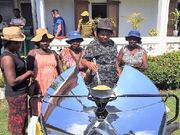
Solar Team Chantal, Chantal, Haiti. January 2017. Photo: M. Buchenic.
- April 2017: We Care to Share is a medical dental mission organized by Dr. Sarah John, a physician from Virginia and Pastor Francois Yves of Sacred Heart Catholic Church in Palm Springs, Florida. Since 2010, the team has travelled to Chantal, Haiti to support the convent medical clinic run by Les Sœurs Missionaires de l'Immaculée. Over two years, We Care to Share upgraded the kitchen facility at the church-run school adjacent to the convent and lessened reliance on charcoal and wood as cooking fuel. In furtherance of that goal, a Solar Cooking Team -- Mary Buchenic, Jennifer Gasser, Sharon Cousins, Stacy Desrosier, and Scouts Russell Desrosier, and Parthiv Chigurupati -- was invited to join them on their most recent mission in January 2017. The Solar Cooking Team conducted solar cooker demonstrations in Port-au-Prince in transit to Chantal. The ovens introduced were the SolSource parabolic by One Earth Designs, Haines Solar Cookers, a homemade box oven, and locally sourced foiled bowl/panel cookers. The main objective was to facilitate successful cooking of traditional Haitian meals. During our four days in Chantal, we met with the school cooks for one cooking session during which they prepared a delicious meal of spaghetti with herring on the SolSource. The other three days the Team met with a local women's group to learn about solar cooking. The women's group (which included a number of men) formed “Solar Team Chantal”. They cooked rice and beans on the SolSource. Cakes and rice were prepared in the other cookers, and water pasteurization was demonstrated. DIY sessions were held each day. At the end of the project, two parabolic concentrators, 40 Haines cookers, and materials for the bowl/panel cooker were donated to the cooks and the women's group. The women's group, aka Solar Team Chantal, has since begun demonstrating solar cooking to others in the community. Members are in communication with the Solar Cooking Team. Additional follow-up is planned in Chantal as well as in Port-au-Prince. The Solar Cooking Team has planned a follow-up trip to Haiti.
- October 2016: Eagle Scout organizes a build of thirty solar cookers for Haiti - For his Eagle Scout project, Russell Desrosier of Fairfax, Virginia, USA, arranged for his Boy Scout troop to build thirty Haines Solar Cookers for Haiti. In the group photo, Russell in the one in the funny hat made from a circular cover. Russell plans to deliver the cookers in January, 2017 to recipients in Haiti as part of a project organized by WeCareToShare, Chantal, a medical-dental relief team that has been working in Chantal, Haiti since the 2010 earthquake. Chantal is a rural rice-farming village approximately 250 km from Port Au Prince on the Tiburon Peninsula. The team obtained a grant from Rotary District 7610 to improve a kitchen at one of the Chantal schools with almost 900 students in grades K - 12. The group has been consulting with solar cooking experts Mary Buchenic and Sharon Cousins, and plans an intensive one-week workshop on solar cooking for the village. They'll be teaching the school cooks to use solar cooking as well as teaching adults from the village.
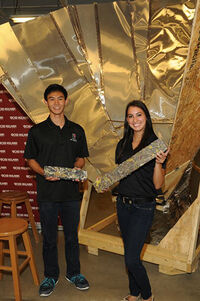
Right to left: Andrea Schultz, mechanical engineering major, with Ryan Tanaka (civil engineering) in front of solar oven used to melt plastic bags into bricks. Photo credit: Rose-Hulman Institute of Technology
- September 2015: Civil and mechanical engineering students from Rose-Hulman Institute of Technology in Terre Haute, IN, USA use solar ovens to melt plastic bags into bricks for construction in Haiti. Read more...
- April 2015: El Fuego del Sol wins the 2015 Energy Globe Award for Haiti. Read more...
History
Early work with solar cooking in Haiti was done by a Canadian organization, Communities in Partnership, a charitable group founded in 1984 in Powell River, British Columbia. Their work, in turn, was inspired by a 1977 feasibility study in Haiti, accomplished to assess the suitability of the county from a climatic/insolation perspective. This work of Dr. Tom Bowman, James Sharbar and Joel Blatt focused on factors of the weather in the different parts of Haiti. They measured insolation in more than a dozen areas, some at different seasons of the year. Without providing all of the detail of their research, the document's overall conclusion was that good solar cooking conditions, generally speaking, existed in Haiti, with, as everywhere, seasonal and some regional variations, probably enabling families to save at least half of their fuel costs.
The original Canadian partnership was with a small community called Saint Marc, but later the program expanded to a number of communities in Haiti. They began by building solar cookers jointly with residents of Saint Marc, and were preparing to start an ambitious pilot project when a major coup interrupted normal life in Haiti (1991). In that disturbed time, the Canadians decided to turn their efforts to a survey of all solar cooking activity in the country. They had heard bits and pieces of other small projects but had no overall picture of the situation. In the next months, they devised a questionnaire that was sent to over 30 locations in the country where solar cooking had been tried or demonstrated. Thus, while the information is now dated, a picture does exist (even if admittedly not complete) of what was a substantial portion of solar activity in the country at the time.
The conclusions of this study proved to be difficult (or impossible?) to summarize numerically, but excerpts from the reports received give the flavor of work in a wide range of communities, allowing some generalizations to be made. Short reports are provided from 19 of the 30 communities surveyed. Key figures in solar promotion in this country included the Brace Research Institute of McGill University, a number of religious organizations, the Canadian Communities in Partnership group, a number of individuals, and one enterprise promoting a particular cooking model.
Commonalities and differences were seen in the reports. A variety of cooker designs were in use: the solar box cooker (the most common), a steam cooker, and parabolic cooker, all in a variety of materials, wood, cardboard, and metal. Two different approaches were seen, one believing that uptake would be higher and longer lasting if people made their own cookers, investing their own time and energy. Other disagreed and felt that efficiency, perhaps more certain with a manufactured product, was more important than the "ownership" conveyed by self-building. Strong and regular usage was fairly rare, despite the extreme need. The various groups were not working together for the most part, thus not maximizing their learning from one another's' experiences. Need was everywhere great, but cost of the cookers was nearly prohibitive for many.
Two additional resources in Haiti in the early days of solar promotion were: the solar cooking resource center, created in the Haitian-American Institute by librarian Eleanor Snare and, in 1992, a first Haitian National Solar Cooking Conference held in Port-au-Prince. In that same period, a number of Haitian solar cooks traveled to other solar cooking conferences, regional and worldwide.
Since the early years, a range of sporadic attempts continues the good beginnings of the earlier era. The country has however continued to experience political unrest, always hampering any development efforts. Nonetheless, efforts at promotion have continued. The Free Methodist Church of Haiti, located in the capital Port-au- Prince, has worked diligently, despite personnel changes, at solar promotion. Over the years, they have distributed over 1,000 solar cookers, primarily of the panel variety, the least expensive version available today. To help with follow-up, they have formed committees of solar cooks in several towns.
The Rotary Club of Brookings, South Dakota, U.S.A., along with other clubs in its Rotary district, have joined Solar Oven Partners, a cooperative project with the United Methodist Church. The collaboration began in 1998 and by December of 2002, the project had distributed more than 300 ovens (on a subsidized basis) and trained 2,500 Haitians to use them. An on-site infrastructure is being organized, working with the Methodist Church of Haiti. Using a basic philosophy of "empowering people through self help", the Rotarians and Methodists were continuing the long tradition of "harvesting sunlight" in this nation. Deforestation here is already at an extreme stage, hence need continues to be great.
A long time advocate of solar cooking in Haiti, Jack Anderson (an early Communities in Partnership leader), has tried a range of dissemination methods, employing "animatrices" or extension workers initially, then re-conceptualizing them as small-scale entrepreneurs. His knowledge of Haiti is extensive, but political events have continued to make efforts very difficult. In the last project described below for Haiti, Jack has played an important role in yet a different method of promoting solar cooking.
That most recent addition to the range of solar offerings in Haiti is structured differently from its predecessors. In this instance, a business, Sun Ovens International, began operating within the country, using a very interesting distribution mechanism. As described on the Sun Oven website (http://www.sunoven.org)> the plan included a number of components.
The project selected 500 women in one area of Haiti for initial training in solar cooking, using the cardboard panel cooker called the CooKit. This device served as a teaching tool as participants were requested to keep records of their cooking attempts, results, and fuel savings for a period of three months. Those who proved to be regular users of the CooKit turned in their logs, along with an account of the money they have saved, to obtain a SunOven, sometimes thought of as the "Cadillac" of box cookers. Initially, Sun Ovens International established an assembly plant in Haiti, in which U.S. manufactured components will be put together in country (and perhaps even for export?)
When demand justifies, a full scale manufacturing plant may be established that can serve the needs of the Caribbean basin for this top of the line solar cooking model. (A similar plan is in effect for Ethiopia) It is too soon to know how this will progress, but it was clearly an interesting and unusual tactic for promotion.
The activity was at least partially supported by a loan from the Overseas Private Investment Corporation (OPIC) and from the U.S. Agency for International Development. Sun Oven owner, Paul Munsen, was honored at the United States House of Representatives with the award of the U.S. Department of Commerce's Export Achievement Award for their innovative work in Haiti. Given the desperate situation of the forest situation in Haiti, combined with favorable insolation in most of the country, the country will remain a prime candidate for solar cooking promotion.
- Main article: History of solar cooking
Archived articles
Climate and culture
Solar Cookers International has rated Haiti as the #18 country in the world in terms of solar cooking potential (See: The 25 countries with the most solar cooking potential). The estimated number of people in Haiti with fuel scarcity in 2020 is 3,100,000. An average Haitian family spends $2.30 (U.S.) per week to purchase charcoal.
Jack Anderson has confirmed that very little wood was used in the construction of buildings in Haiti, which means that there isn’t much wood in the rubble to use for cooking after the earthquake. That must make the need for cooking fuel even more acute. Before the quake, more than 90% of all the energy used in Haiti was for cooking fires, mostly in the form of charcoal.
Paul Munsen of Sun Ovens International writes in January 2010:
- "The most successful model we have found in Haiti is to have women go through training on how to make a CooKit. We found much greater success when the women made them due to the pride they took in making it themselves. The readymade CooKits are less expensive and much less hassle than bringing in cardboard, glue, and foil but we found the pride factor to be worth the additional cost and effort.
- The training sessions where 3 hours a day for 3 days and included lunch. The first two days the lunches were cooked in Sun Ovens so the women could see how much faster the food cooked. The last day the food is cooked in the home made CooKit. Part of the training is to teach the women to keep a log on how often they used the Cookit, how much charcoal they saved and how much money they saved not buying charcoal. At the end of 90 days they turn in the log as a down payment on a Sun Oven and pay for the Sun Oven out of the charcoal savings. (See Microcredit.)
- We have distributed approximately 400 Sun Ovens in Haiti using this system. In most countries we try not to start projects in areas where CooKits had been introduced in the past because we have found it much easier to start with Sun Ovens than to overcome negative ideas about CooKits. We have found that if the women do not pay something for the Sun Ovens they most likely will not use them beyond the time that the person who gave it to them is around. We have found the most important factors to be the percentage of household income spent for cooking fuel and how we get women who live one day at a time to understand how much money they can save by not buying charcoal."
El Fuego del Sol reports:
- "Haiti burns over 400,000 tons of charcoal annually (USAID 2011); that amount translates to over 4,000,000 tons of trees destroyed since it takes 10 tons of wood to produce one ton of Haitian charcoal (ESMAP 2007). Regional environmental studies in Haiti, including Ghilardi, et al 2018, have confirmed that the Haitian charcoal industry has a destructive effect on the trees of Haiti. However, these studies have neglected to discuss the health effects of charcoal cooking. International studies that explored the negative health effects of biomass stoves, including Mortimer, et al 2016, have focused on PM2.5 emissions. Charcoal stoves also release CO emissions in dangerous concentrations (WHO 2014)."[1]
See also
- March 2010: A Rapid Assessment of Cooking Fuel Needs in Post Quake Haiti
- January 2010: Haiti's Energy Problems - The Oil Drum
- Haiti Energy Situation - Energypedia
- The climate of Haiti - Wikipedia
- Solar cooker dissemination and cultural variables
Resources
Possible funding
Project evaluations
- December 1977: Solar Cookers for Haiti - Bowman, Sharber, Blatt
Articles in the media
- April 2018: John Buchenic created Global Development Solutions to support international nonprofit agencies. - The Vindicator
- April 2016: These Clark entrepreneurs have some big ideas (Sun Top Solar Cookers)- Clark University
- April 2015: Ad Haiti arrivano le cucine solari, il progetto è italiano - Adnkronos (English version)
- June 2014: José Andrés thinks food can fix the world, starting in Haiti - The Washington Post
- April 2014: Four years after the Earthquake: The Need for Solar Cookers in Haiti - Solar Cooker Review
- September 2013: Haitian to say thanks for solar ovens - The Bismark Tribune
- June 2013: Faith effort creates solar ovens for Haiti - The Bismarck Tribune
- October 2012: A Solar Stove for Haiti -The Sag Harbor Express
- July 2010: Otro Haiti es posible - Yo Cambio
- July 2010: Sun Ovens International Continues To Help Victims Of Haiti Earthquake Through Solar Cooking - PRLog
- April 2010: Solar Powered Products in Haiti - New York Times
- February 2010: Haiti's Tomorrow May Be Rooted In Trees, Fertilizer - The Huffington Post
- February 2010: Haiti’s (Solar) Power - The CUNY Institute for Sustainable Cities Blog
- January 2010: Haitian Student Heads Home to Help - University of Buffalo Reporter
- January 2010: Solar Salvation for Haiti? - MSNBC
- July 2008: Rotary ships dinners, ovens to Haiti - The Brooking Register
- February 2007: Niedert marvels at Haitian people - Madison Daily Leader
Audio and video
- November 2018:
- June 2017:
- October 2017:
- November 2012:
- July 2011:
- September 2010:
- August 2009:
Web pages
Contacts
The entities listed below are either based in Haiti, or have established solar cooking projects there:
SCI Associates
- Main article: Solar Cookers International Association

